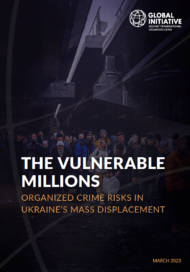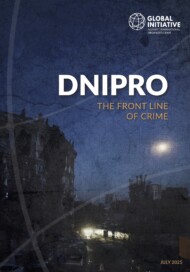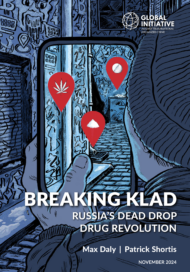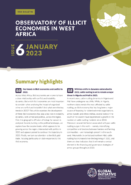Posted on 29 Mar 2023
The risks of human trafficking were quickly flagged by many in the international community since Russia launched a full-scale invasion of Ukraine.
Conflict has long been recognized as a driver of trafficking, from forced labour and sexual exploitation to the recruitment of child soldiers. Another reason for concern is due to the deeply entrenched nature of these crimes within Ukraine prior to the invasion, as reported in the Global Organized Crime Index 2021.
A large number of actors, especially Ukrainian civil society, have worked to alleviate the suffering of vulnerable population in Ukraine, but millions of people continue to endure extreme poverty as a consequence of the Russian invasion. Desperate for money, food and other basic necessities, some may have turned to informal work to survive, leaving them vulnerable to exploitation by traffickers.
Faced with these risks, millions of Ukrainians have fled in fear for their lives. Some moved to regions further away from the ever-encroaching front line, while others headed for the border with Poland, Hungary, Moldova, Romania or Slovakia: the gateways to the EU. At crowded train stations, husbands, fathers and sons said goodbye to their loved ones, prevented from leaving by Kyiv’s order to mobilize. Ukraine was on the move, at a speed and scale beyond anything witnessed in Europe since the Second World War.
Although much of the world’s attention has focused on the millions of refugees heading to Europe, a comparable number of Ukrainians have found themselves internally displaced within their own country, adding to the more than 850 000 already displaced as a result of the fighting in the Donbas since 2014. In addition to internally displaced persons (IDPs), the conflict has also created millions of in-need, non-displaced people (estimated at 6.9 million in December 2022), as well as millions of returnees throughout the second half of the year.
Behind the statistics were countless individual stories of tragedy and hardship. Often taking only what they could carry, these refugees and IDPs struck out without knowing what awaited them, leaving behind jobs, education, and family. Henceforth, these vulnerable millions would be reliant on the kindness of strangers to survive. Amid this tide of vulnerability, there were those who assessed the situation in a very different light.
‘For predators and human traffickers,’ said UN Secretary-General Antonio Guterres in March 2022, ‘war is not a tragedy. It is an opportunity.’
This report assesses the extent to which those criminal actors succeeded in exploiting the opportunities within Ukraine and in Europe in 2022 – and where future risks may lie.




